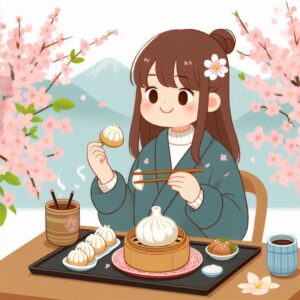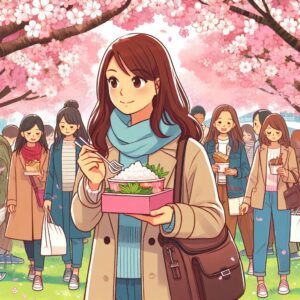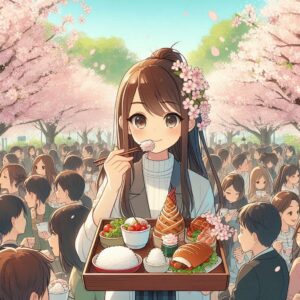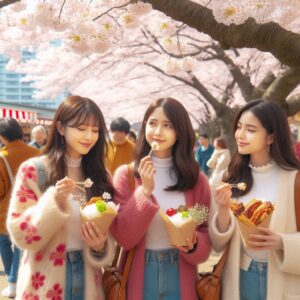花より団子とは?
「花より団子(はなよりだんご)」は、美しいものや見栄えの良いものよりも、実際に役に立つものや実利を優先することを意味することわざです。美しい花を楽しむことよりも、食べられる団子の方が現実的で満足感がある、という価値観を示しています。このことわざは、実用性や実利を重視する姿勢を表しています。
由来と背景
「花より団子」の由来は、日本の「花見」の風習からきています。桜の花見が盛んになった時代、人々は桜の花の下で宴会を開き、団子や酒などを楽しんでいました。花見の本来の目的は桜の美しさを楽しむことですが、参加者の多くが花よりも団子や酒などの食べ物に夢中になっていたという状況が、「花より団子」という表現につながりました。
花は一時的に美しいものの、食べ物のように直接的な満足をもたらすものではありません。団子が空腹を満たし実際的な価値があるのに対して、花は見るだけであり、実際的な効果は薄いことから、「実利を重視する」という考え方を象徴する言葉となりました。
現代での使用例
「花より団子」は、美しさや見栄よりも、現実的で役に立つものを選ぶ姿勢として広く使われます。
経済的な価値観や生活での優先順位
例えば、豪華な装飾やデザインにお金をかけるより、生活必需品にお金を使う選択をする場面で「花より団子」を使います。「見栄を張るよりも、必要なものにお金を使う」といった意味合いを含んでいます。
仕事や学業での実用性重視の姿勢
実用的なスキルや資格を重視する際に「花より団子」の考え方が適用されます。たとえば、「見栄えの良い資料を作るより、役立つ内容を重視しよう」という状況にも使われます。
プレゼントや贈り物の選択
誕生日やイベントで、豪華な飾りよりも実用的なものを選ぶ際にも「花より団子」の精神が表れます。特に実用性があり、長く使えるものを重視する場面で、「華やかさより実用性を選ぼう」として用いられることがあります。
類似表現
「現実主義」や「実利主義」といった言葉も、「花より団子」と似た価値観を指します。また、「骨折り損のくたびれ儲け」という言い回しも、見かけだけを重視することの無駄を表しており、実際的な価値を重視する視点で共通しています。
教訓
「花より団子」は、見た目や見栄えにとらわれず、実用的で役立つものを選ぶ姿勢を教えています。時に目を引く美しいものに心を奪われがちですが、現実的な選択が必要な場面では、物事の実用性を優先するほうが賢明であることを示唆しています。
「花より団子」とは、美しさや見栄えよりも、実用的で役に立つものを選ぶことを表したことわざです。この表現は、生活や仕事の中で、現実的で実利をもたらす選択が求められる場面に適用されます。物事の価値を冷静に見極めるための教訓とも言え、華やかさや外見に惑わされず、本当に価値があるものを選ぶ姿勢の重要性を教えてくれる表現です。
Hana yori dango (dumplings over flowers)” is a proverb meaning to give priority to what is actually useful or practical over what is beautiful or good-looking. It expresses the value that an edible dango is more practical and satisfying than enjoying a beautiful flower. This proverb expresses the value of practicality and pragmatism.
Origin and Background
The origin of “dumplings over flowers” comes from the Japanese custom of “hanami” (cherry blossom viewing). In the days when cherry blossom viewing was popular, people held banquets under the cherry blossoms and enjoyed dumplings and sake. The original purpose of hanami was to enjoy the beauty of cherry blossoms, but the fact that many of the participants were more absorbed in food such as dumplings and sake than in flowers led to the expression “dumplings over flowers”.Flowers, while temporarily beautiful, do not bring direct satisfaction like food does. While dumplings satisfy hunger and have practical value, flowers are only to be seen and have little practical effect, and so the phrase became symbolic of the idea of “pragmatism.
Examples of Modern Usage
The phrase “dumplings over flowers” is widely used as an attitude of choosing practical and useful things over beauty and vanity.economic values and priorities in life.
For example, “dango over flowers” is used in situations where people choose to spend money on necessities of life rather than on extravagant decorations and designs. It carries the connotation of “spending money on necessities rather than on vanity.”Emphasis on practicality in work and study
The “dumplings over flowers” concept is applied when emphasizing practical skills and qualifications. For example, it can be used in situations where the emphasis is on useful content rather than on making materials that look good.Present and gift selection
The “dango over flowers” mentality is also expressed when choosing practical items over extravagant decorations for birthdays and events. It is sometimes used as “let’s choose practicality over pomp and circumstance,” especially in situations where practicality and long-lasting usefulness are important.Similar expressions
Words such as “pragmatism” and “pragmatism” also refer to values similar to those of “dumplings over flowers. The phrase “bone-dry, tiring profit” also expresses the futility of focusing only on appearances and shares the viewpoint of emphasizing practical value.Lesson Learned
The phrase “dumplings before flowers” teaches us to choose what is practical and useful, rather than what looks or appears to be. While it is sometimes easy to be seduced by something eye-catching and beautiful, it suggests that in situations where practical choices need to be made, it is wiser to prioritize the practicality of things.Conclusion
The proverb “dumplings over flowers” expresses the idea of choosing what is practical and useful over what is beautiful and presentable. This expression applies to situations in life and work where practical and pragmatic choices are required. It is a lesson in calmly assessing the value of things, and teaches the importance of being willing to choose what is truly valuable, rather than being distracted by glamour and appearances.
AIが描いた「花より団子」
YouTube(動画)
AIが描いたイメージ(画像)








コメント